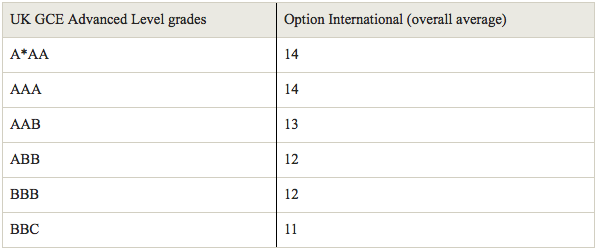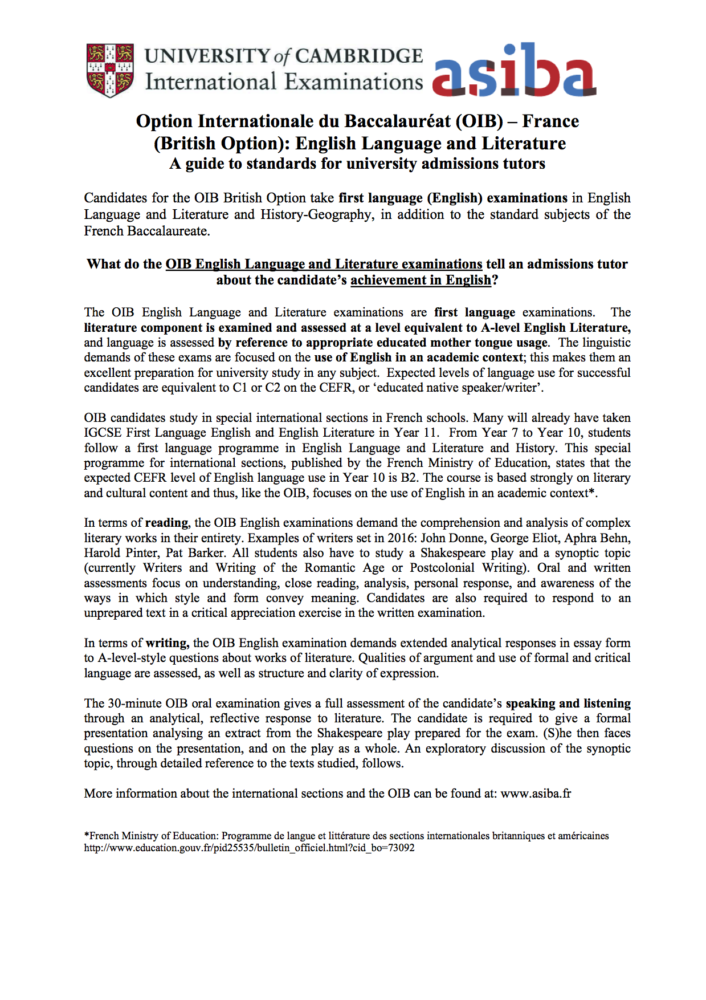Why consider a British university?
University in the UK is a very attractive option to many OIB students. It may be particularly interesting for students to develop an international profile after having spent their school years in France. Students with British roots may wish to connect with this part of their culture. Others may have enjoyed the educational culture of the British Section and wish to experience this approach in the context of your higher education.
British universities are among the best and most widely recognised in the world, with four institutions in the top ten in the QS World University Rankings. As well as emphasising real depth of study and fostering independence of thought, they offer considerable opportunities beyond the curriculum, including preparation for the expectations of the professional world.
The OIB is a particularly good preparation for study in an Anglophone university country, since students have not only acquired a high level of English proficiency, but have also experienced an English pedagogical style requiring independent thought and dialogical learning. This helps them to adapt rapidly to the style and approach of undergraduate study in the UK and other Anglophone countries.
Admissions
The British university system is selective: the OIB does not, in itself, guarantee admission to any British university. Each institution considers a student’s application independently and may make a conditional offer (i.e. an offer of a place on condition that the applicant achieves specified marks in the final examinations of the OIB). Alternatively, the institution may decline the student’s application.
Students apply to British universities through a centralised admissions service, UCAS, which allows them to make up to five applications.
How are OIB entrance requirements expressed?
British universities generally make ‘conditional offers’ that require:
- an overall mark out of 20 (e.g.13/20)
- one or more specified marks in individual subjects (e.g. 13/20 with 13/20 in Mathematics for an Engineering applicant).
The OIB as proof of English Language competence
The British version of the OIB is widely taken by British universities as proof of English language competence, without the need for further proficiency tests. The linguistic demands of the English and History-Geography exams concern the use of English in an academic context through essay-based analytical responses; this makes them an excellent preparation for university study in any subject. The levels of linguistic achievement for successful candidates are C1 or C2 on the CEFR (Common European Framework of Reference for Languages), or ‘educated native speaker/writer.’
Click here for a guide outlining the linguistic demands of the OIB for university admissions tutors.
OIB and A Level admissions requirements
Admissions requirements in British universities are most commonly expressed in A level grade combinations. Admissions tutors ‘translate’ these grade combinations into OIB terms. The main published sources of comparison are the OIB Handbook and tables created by individual universities such as the University of Bristol (below).
N.B. This table is included purely as an example: universities are free to set whatever admissions requirements they consider appropriate. In general, a course requiring AAA at A level will require 14 or 15 overall in the OIB

For individual required subjects, we will specify point scores which will range from 13 to 17/20.
Please note:
British universities make no qualitative distinction between different séries of the Baccalaureate: they see the three séries of the Bacclauéat Général as representing different but equal challenge. Naturally they will expect that an applicant for a science course will have taken the ‘S’ stream – but applicants for non-scientific and non-mathematical subjects are treated with absolute equality regardless of the stream they have taken.
Some universities require applicants to take special tests in specific subjects as part of the admissions process. Applicants for Medicine, Dentistry or Veterinary Science are routinely required to take tests. Oxford University has its own series of tests in a wide range of subjects. Other universities such as Cambridge, Imperial or UCL require students to complete a short task or to sit a test as part of their selection process
Brochures and documents
Click on an image below to download the brochure/document PDF.


